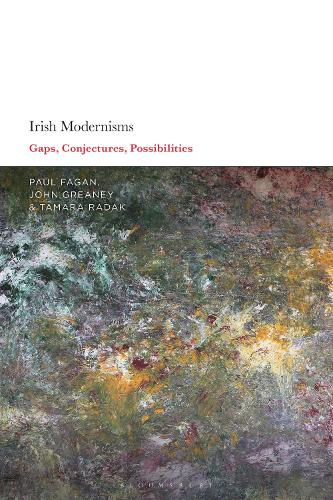
Irish Modernisms: Gaps, Conjectures, Possibilities
(Paperback)
Available Formats
Publishing Details
Irish Modernisms: Gaps, Conjectures, Possibilities
By (Author) Paul Fagan
Edited by Dr John Greaney
Edited by Tamara Radak
Bloomsbury Publishing PLC
Bloomsbury Academic
20th April 2023
United Kingdom
Classifications
Tertiary Education
Non Fiction
Literature: history and criticism
Literary studies: c 1900 to c 2000
820.99415
Physical Properties
Paperback
280
Width 156mm, Height 234mm
Description
This book focuses on previously unexplored gaps, limitations and avenues of inquiry within the canon and scholarship of Irish modernism to develop a more attentive and fluid theoretical account of this conceptual field. Foregrounding interfaces between literary, visual, musical, dramatic, cinematic, epistolary and journalistic media, these essays introduce previously peripheral writers, artists and cultural figures to debates about Irish modernism: Hannah Berman, Ethel Colburn Mayne, Mary Devenport ONeill, Sheila Wingfield, Freda Laughton, Rhoda Coghill, Elizabeth Bowen, Mirtn Cadhain, Joseph Plunkett, Liam OFlaherty, Edward Martyn, Jane Barlow, Seosamh Torna, Jack B. Yeats and Brian ONolan all feature here to interrogate the terms implications. Probing Irish modernisms responsiveness to contemporary theory beyond postcolonial and Irish studies, Irish Modernisms: Gaps, Conjectures, Possibilities uses diverse paradigms, including weak theory, biopolitics, posthumanism and the nonhuman turn, to rethink Irish modernisms organising themes: the material body, language, mediality, canonicity, war, state violence, prostitution, temporality, death, mourning. Across the volume, cutting-edge work from queer theory and gender studies draws urgent attention to the too-often marginalized importance of womens writing and queer expression to the Irish avant-garde, while critical reappraisals of the coordinates of race and national history compel us to ask not only where and when Irish modernism occurred, but also whose modernism it was
Reviews
This varied and vibrant collection accomplishes two huge tasks: consolidating the field of New Irish modernisms and exploring hitherto unperceived objects (journalism, letters, films, comic strips, lost poems, scientific writing, etc.) along with less visible actors. It is bracing to read Joyce with Hannah Berman, Becketts bilingualism with ONolans and Cadhains, or place W. B. Yeats next to Thomas MacGreevy and Ethel Colburn Mayne. Those alert chronicles redeem the fullness of past Irish cultural history: whatever was old or unmodern is here made fresh and strange. * Jean-Michel Rabat, University of Pennsylvania and American Academy of Arts and Sciences, USA *
Irish Modernisms: Gaps, Conjectures, Possibilities is a welcome contribution to the field of Irish modernism, impressive in its conception and remarkably fresh and timely despite engaging a field and a set of concepts that have been up for scholarly debate for quite some time the joy of the chapters is their ability to approach (and invite a study of) Irish modernism from a bottom-up historical perspective, while interrogating the cultural capital that has accrued to the critical label. This is a powerful and original way of thinking through the paradox of a scholarly field that occupies the very centre of any Global Modernist canon yet remains profoundly (even proudly) local in its historical, political and linguistic self-identifications. * Ruben Borg, Associate Professor in English at the Hebrew University of Jerusalem *
Author Bio
Paul Fagan is a Senior Scientist at Salzburg University, Austria, President of the International Flann O'Brien Society, and a founding editor of The Journal of Flann O'Brien Studies. Fagan is the co-editor of Stage Irish: Performance, Identity, Cultural Circulation (Irish Studies in Europe), four books dedicated to Flann O'Brien and serves on the editorial board of the Production Archives special collection. He has published widely on modernism and Irish studies, and is completing a monograph on the Irish literary hoax. John Greaney is a Fulbright-NUI Postdoctoral Fellow at the University of Pennsylvania, USA. He is the author of The Distance of Irish Modernism: Memory, Narrative, Representation. His work has been published in Textual Practice, Irish Studies Review and Derrida Today, amongst other venues. Tamara Radak is a Postdoctoral Researcher at the University of Vienna, Austria. Her publications include essays in James Joyce Quarterly, The Review of Irish Studies in Europe, Flann O'Brien: Problems with Authority and European Joyce Studies. She is currently completing a monograph titled No Sense of an Ending Modernist Aporias of Closure. She is a member of the COST Action Distant Reading for European Literary History and has been an invited speaker at the Trieste Joyce School and the Vienna Irish Studies and Cultural Theory Summer School.
